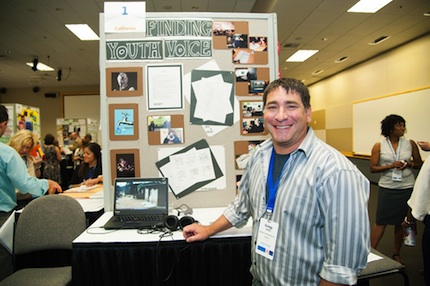Innovative Educators Show Off Projects in Redmond
- By Dian Schaffhauser
- 08/06/12
Many of the 11 winning projects in Microsoft's latest Partners in Learning competition focus on greening, gaming, and collaboration.
For example, first place in the collaboration category was taken by Jamie Ewing, a teacher at Mount View Elementary in Seattle. His project, "Science in the Sky and Our Backyards: A Virtual Science Fair," guides fifth graders to explore Earth systems and brainstorm in small groups to create science experiments that will be presented in a virtual world instead of the usual science fair model. They use tools such as PowerPoint, Movie Maker, or Scratch to build slideshows, videos, and games that are stored on Microsoft's cloud storage service, Windows Live SkyDrive, and shared with students elsewhere in the world. They'll also present their findings locally as potential ecology projects and invite community leaders to participate via Skype.
The runner-up in the collaboration category was Julie Hembree from AG Bell Elementary in Kirkland, WA, who entered the project, "Kid Lit Movies: Book Trailers for Young Readers." In three fourth grade library classes, teams selected a favorite book, storyboarded the content using Microsoft OneNote, and then created book trailers with Windows Live Movie Maker. These movies are used as digital advertising in the school's library.
The competition is intended to spotlight innovative teachers and school leaders who use technology in their curriculum creatively to help improve the way kids learn. Out of thousands who applied, 100 educators from 25 states attended an event in Redmond to compete for the opportunity to represent the United States at the Partners in Learning Global Forum, which will take place in Prague this November.
| | 
Gregg Witkin won the Educator as Innovator and Change Agent award for his project "Finding Youth Voice." | |
Microsoft paid for the educators to make the trip to Redmond and will also cover the expenses of the Prague trip too. Prizes per se aren't given, but educators have told the organizers that the biggest benefit of participating is getting the opportunity to network with like-minded educators, share their lesson plans, and collaborate.
"These winning educators are catalysts for change and are the best in the nation at embracing technology to inspire and engage students and help transform education in their local communities," said Andrew Ko, general manager of Microsoft's U.S. Partners in Learning. "They all are incredibly passionate and driven to make an impact on each and every student they teach. Their creative project-based-learning classroom activities show real impact on student learning and success and should be scaled out as best practices in their own school districts and across the country."
A score of judges that included state and local officials and education leaders from around the country scored the projects in multiple areas that reflect the precepts of 21st century learning: collaboration, knowledge building and critical thinking, learning beyond the classroom, cutting edge use of technology for learning, and educator as innovator and change agent.
The Prague event, which takes place November 28 through December 1, is the culmination of local and regional events that reach nearly 200,000 participants from 115 countries.
Other winners include:
Knowledge Building and Critical Thinking
Jennifer Bevill with the Louisiana State University Laboratory School in Baton Rouge, LA took first place for her project, "Peace Project," which uses technology to communicate and collaborate with students in Japan.
Runners-up Cheryl Arnett and Melany Neton with Sunset Elementary School in Craig, CO presented, "Let's Go To Disneyland!," in which first and second graders researched, planned, and traveled to Disneyland, using an Xbox 360 Kinect.
Extended Learning Beyond the Classroom
Pauline Roberts and Rick Joseph from Birmingham Covington School in Bloomfield Hills, MI won first place with "Doing Business in Birmingham," which uses technology to teach students and the local community about sustainable business practices.
Runners-up Sarah Collins and Jo Spark from Moody Elementary in Moody, TX presented "Cans for the P.L.A.N.," a campaign by third graders to make the world cleaner and raise money by recycling aluminum cans to purchase a new piece of equipment for a classroom.
Runner-up Jolie Barker from Slaughter Elementary in McKinney, TX presented "Xbox 360: the iConnect Project," in which second graders connected with classrooms around the world in reading Magic Tree House books and creating multimedia reports and Kodu games to extend and express their learning.
Cutting-Edge Use of Technology for Learning
Robin Lowell and Sherry Hahn from Washington State School for the Blind in Vancouver, WA won first place with "Accessible Distance Learning of Mathematics for Blind and Visually Impaired High School Students," which uses technology to reach students from more than 170 miles away.
Runners-up June Teisan and Alexandra Beels from Harper Woods Middle School in Harper Woods, MI presented "The SWIiM Team," which places urban seventh graders into STEM activities out on the Great Lakes to foster environmental awareness and build stewardship skills.
Educator as Innovator and Change Agent
Gregg Witkin from Boynton Continuation High School in San Jose, CA won first place with "Finding Youth Voice," which pushes students to create media presentations that serve as vehicles for social change.
Educator's Choice
Todd LaVogue from Roosevelt Community Middle School in West Palm Beach, FL took first place with "What's Up Egypt?," in which his students created a TV show about ancient Egypt, styled on the Today show.
More information about the winning projects is available at blogs.msdn.com.